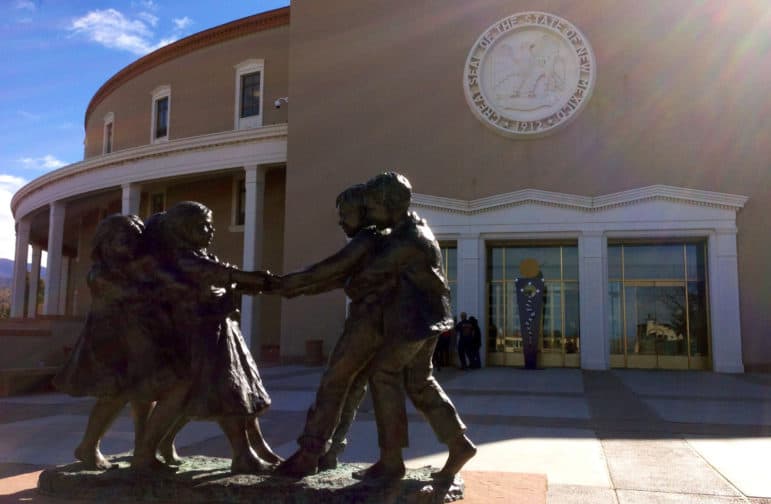
Heath Haussamen / NMPolitics.net
A statue outside the Roundhouse in Santa Fe.
When Rebecca Dow decided to run for the state House of Representatives, she drove around her sprawling district and saw run-down vacant buildings in communities, often in or near downtowns.
Dow, a Republican from Truth or Consequences, is now serving her first term in the House, and she has a plan to get businesses into those shuttered buildings instead of signing leases for newer properties on the outskirts of small towns.
Under House Bill 205 — the first bill sponsored by Dow — communities with populations of less than 50,000 would be permitted to grant variances from state building codes for commercial buildings if there is no impact on health and safety.
“Across our state, in our rural areas, there are vacant buildings in the downtown areas,” Dow told a House committee Thursday. “They’re vacant and they’re vandalized. We have great opportunity here for someone to open a business and help in the beautification of a downtown area.”
Some trade union representatives spoke against the bill, saying there is no definition of what type of variances would be allowed. Unless health and safety requirements can be clarified, the public might be at risk, they said.
Dow’s legislation, the Vacant Rural Buildings Act, received a unanimous do-pass recommendation from the House Local Government, Elections, Land Grants and Cultural Affairs Committee. It now advances to the Judiciary Committee.
Dow realizes the measure faces a steep climb — especially in a Legislature that likes to chew over initiatives for a few sessions before approving them. But as a new lawmaker, she hopes her one fresh idea can take hold and become law, especially since the effort requires no state money.
Under current law, if a long-time business closes and a building is vacant for three months, a new tenant has to bring the structure up to construction codes — even though a prior tenant might have occupied it safely for years. Sometimes that calls for expanding entrance doors, adding parking or putting in more lighting or electrical outlets.
Dow said a one- or two-person accounting business or other family enterprise may not need all the upgrades to operate safely. As a resident of Truth or Consequence, she said she often hears about a business planning to open in an older building, then changes its plan because of costs.
“Sometimes these improvements can cost up to $100,000,” Dow said.
Since she introduced the bill, Dow said she has heard from a husband and wife who have been seeking to open a restaurant in Roy in northeast New Mexico but so far have been unable to find a suitable building, even though several are vacant.
Dow said she would meet with the construction industry before the bill is heard by the House Judiciary Committee. “The variances will not be available for health and safety issues,” she said. She added the state already allows variances for historically significant buildings and that might be a model for what she wants to do.
Unlike large cities and counties that have their own building codes and inspectors, smaller towns in New Mexico use the state Construction Industries Division for building permitting.
Dow’s bill has the support of the New Mexico Municipal League, which said communities could grant variances for required upgrades to buildings but wouldn’t be required to do so.
Contact Bruce Krasnow at brucek@sfnewmexican.com.